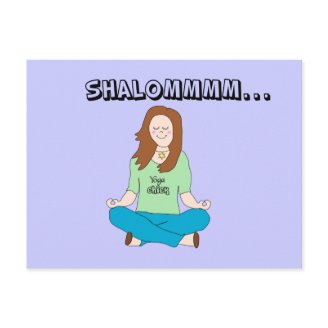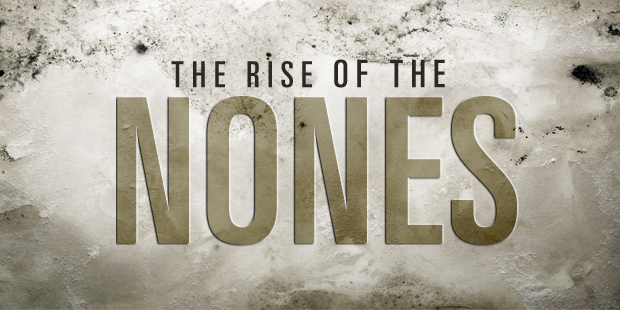(This is an adapted version of the sermon I delivered on Friday evening, December 28, 2012 at NSCI)
I’d
like to share a recent self- revelation: deep down inside, my soul is the soul
of a None. No, I didn't spell that
wrong. I’m not referring to a Catholic nun of course! Let me explain. A "None" is the
name given to a “member” of the fastest growing religious group in our country
- a seemingly new religious denomination named by the Pew Forum and other religion
demographers as those who will not identify with any singular religious
grouping, category or denomination. The
Nones have grown from 15% to 20% of the US
It seems like a pretty sad
indicator for the face of organized religion at first. But don't get too
distressed. Here's something
interesting: Although atheists and agnostics are included in the "Nones"
category, their specific populations have remained a steady, flat 6% for a
quite a while now. So who are the other
now 14% of our population of those not identifying in one singular religious
category but yet not atheist or agnostic, and why on earth would I consider
myself to be like them?
 Well, 37% of them say they
are spiritual. Check. 68 % of these Nones say they believe in God.
Check. 58 % say they have a deep connection
with nature and earth. Check. 1 in 5 say
they pray daily. Check.[i] The Nones are searchers, seekers, boundary
pressers and question askers, souls unwilling and uninterested in tightly
reinforced definitions and denominations. They may very well have deep
spiritual encounters in a prayer service, but they will also have them in their
yoga class, or walking in the Botanic Gardens. Or listening to stirring music
or reading a powerful book. Check,
Check. They view themselves as open
vessels for the meaningful and the sacred in all experiences. Check. In many ways, they sound like they'd make
great Jews!
Well, 37% of them say they
are spiritual. Check. 68 % of these Nones say they believe in God.
Check. 58 % say they have a deep connection
with nature and earth. Check. 1 in 5 say
they pray daily. Check.[i] The Nones are searchers, seekers, boundary
pressers and question askers, souls unwilling and uninterested in tightly
reinforced definitions and denominations. They may very well have deep
spiritual encounters in a prayer service, but they will also have them in their
yoga class, or walking in the Botanic Gardens. Or listening to stirring music
or reading a powerful book. Check,
Check. They view themselves as open
vessels for the meaningful and the sacred in all experiences. Check. In many ways, they sound like they'd make
great Jews!
What are the true defining
characteristics of Jews anyway? Outside
of not believing in more than one God, what other consistent indicator or
unifier is there - in origin, in practice, in ethnicity, in language, in
sexuality or in family structure? Jew by
birth, Jew by choice, Jew by matrilineal or patrilineal descent? Jew by
synagogue membership or not? Jew by how
many days a year or lifetime they attend services? None of these offer a real limitation
on what being Jewish means, only what Judaism can mean to a given individual in
a given situation.
After all, who among us fits
perfectly in the category of any label?
We are by nature complex, amalgams of identities, experiences,
histories, practices and beliefs that don't generally fit a cookie cutter
definition or picture. And that, if you
asked me, is a pretty wonderful thing – these combinations keep us interesting,
diverse, learning and evolving! If being
a None equates to a rejection of black and white, absolutist religion then the
real question should be, who among us isn’t a None?
So what at first seems like
a pretty ominous report of eventual religious demise instead turns out, I would
suggest, to indicate an evolution in the openness of what faith based and religious
communities, including Jewish ones, will someday become, if they aren't already
on their way.
Here's the snag: Many Jewish organizations and Jewish
population study publishers have a problem with what I just said. They want to perpetuate the emotional
response from what seems to have become Judaism's historical
meta-narrative: Someone, somewhere is
trying to put an end to Judaism by steering us away from our long-held, steady
and implied "proper" roots and traditions.
Maybe it is an external demise that's predicted, maybe it’s an internal
one, as the latest Chicago and New York
But if the only
justification for practicing Judaism, for identifying as “Jewish” is to react
against this so-called erosion, then how can it ever be possible to really
flourish? Survival mode never yields
much other than stasis at best, and at worst, ironically, it causes the very
same erosion it was created to fight against.
I think that is what we are
seeing now in the non-Orthodox world, and maybe even the Orthodox world too. The reality of most Jewish institutions
 for
the last 6-7 decades has been one of survivalist mentality. It’s as if we, at some point, forgot that at
its heart, Judaism has always, always been about a relationship between the
evolving mundane and ineffable qualities of life, with Jewish traditions and
laws not designed for stagnation, to serve solely as anchors of vessels never
intended to take to sea, but more as wide, billowing sails, enabling us to
traverse and discover more of the endlessly revealing cosmos of which we are an
integral, covenantal, evolving part. Solely
surviving inhibits and prohibits thriving.
for
the last 6-7 decades has been one of survivalist mentality. It’s as if we, at some point, forgot that at
its heart, Judaism has always, always been about a relationship between the
evolving mundane and ineffable qualities of life, with Jewish traditions and
laws not designed for stagnation, to serve solely as anchors of vessels never
intended to take to sea, but more as wide, billowing sails, enabling us to
traverse and discover more of the endlessly revealing cosmos of which we are an
integral, covenantal, evolving part. Solely
surviving inhibits and prohibits thriving.
One key reason the Nones
are important is because they are not interested in just surviving, erosion, in
anchored vessels that can’t sail; they are wholly invested in yearning, in
seeking, in thriving. They seek deep
rooted answers to the significant questions of existence and meaning in the
universe. Their yearnings, I believe,
are not unique, but are actually shared by every human being. It’s just that not
everyone is comfortable or willing to articulate them in a so-called religious
or Jewish context because we, as Jewish institutions, have failed to foster an
environment where such questions are the norm.
But these questions are ultimately what we find at the heart of life.
Our desires to know and
deepen our understanding of ourselves, our place in the world, what we are here
to do, ultimately our search for Truth – with a capital T – the asking of and
searching for answers to these questions, I’d say prove the very purpose for
which God created us in the first place.
And that search is necessarily about wrestling and digging. The goal is not reaching “a single, eternal
realization,” as Rabbi Irwin Kula teaches, but instead “living out the process of
realizing again and again.”[ii]
Indeed, this call to seek a
wider, more inclusive, deeply resonating and all-encompassing Judaism, I
believe, is the call to all of us at this precise moment in our evolution as a
faith.
So I’m a Jewish None, and maybe
you are too. And maybe we’re all better for that.
[i] http://www.pewforum.org/Unaffiliated/nones-on-the-rise.aspx
[ii] From
the teachings and language of Rabbi Irwin Kula in “Yearnings” p.4.
[iii] Ibid.
[iv] These
teachings on Emet are sourced to any number of places, both ancient and
modern. The play on Emet and Met is a
reference to any number of Golem narratives.
See Sefer Yitzirah as an example.
The concept of Emet as comprised of the first, middle, and last letters
of the alphabet I first heard mentioned in rabbinical school and have since
heard and read mentioned many times, however I do not know the original source
of it. Irwin Kula offers a fitting
description of these stories, and it is from his conceptions of the stories
that this sermon derives its meaning.

No comments:
Post a Comment
I'd love to hear your thoughts/comments/ideas. Please post here: